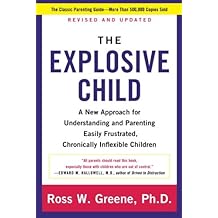I’m reading a book called Lost at School by Ross W. Greene, Ph.D. I haven’t finished it yet, but have wished ever since I started it that I had known these ideas about handling challenging children when I was a mom with young children. I’m imagining that some of our conflicts might have been avoided.
This year we have a larger number of “explosive” children than I have experienced before in 20 years of teaching. Specific unsuccessful interactions have led me to do more reading about behavior. Dr. Greene’s book has the refreshing view that “children do well if they can.” I know I have named certain behaviors seen at school as willful, attention-seeking, or manipulative. I guess in the moment I have reacted emotionally and haven’t stopped to think what the teachable, behavioral skills might be which would allow a student to do well. I am humbled as I read and see where I still have so much room to grow. I know I need a larger toolbox for working with some students.
From my own experience I know that the most powerful influence we can have on children is through building relationships with them. Like many of you, I remember the teachers most who reached out to connect with me. Dr. Greene puts it this way:
Regardless of your role in school, if you want to help a kid, you’re going to need a helping relationship to accomplish the mission. Time and time again, research (and practical experience) has shown that the most reliable factor leading people change–by far–is the relationship they have with the person helping them change.
As a specialist, my time with students is limited to the 30-45 minutes I get to spend with them in various interventions. Sometimes I feel pressure (probably self-imposed) to work hard and then work hard some more. But when I take a few moments to really listen as my students engage me in conversation (rather than push forward into work-mode), I see their smiles. I learn about their families. I feel their insecurities and their strengths. I laugh with them. Then, I realize that the helping relationship is not just teacher helping student.
I am helped as a human being when I listen and connect to the students in front of me. I am lifted and carried on their energy. I’m no longer lost, but found.



You are more than an intervention teacher, you are ministering to the whole child. Those children are so fortunate to have you in their lives.
Thank you for this thoughtful post. It is easy when we are tired or frustrated or uncertain of where to go when working with a challenging student to throw up our hands. But, it is in those hard moments that we need to remember to “really listen.” I appreciate the reflection your post offered me. I can’t wait to see you at Sally’s!
I have read Lost at School and found it transformative. It’s also hard to live, though I swear it’s changed the way I think about kids even if I’m far from perfect in my interactions with them. I love the quote you chose, but more than that, I love how you end this post: “I am helped as a human being when I listen and connect to the students in front of me. I am lifted and carried on their energy. I’m no longer lost, but found.” Beautifully said. I will remember this.